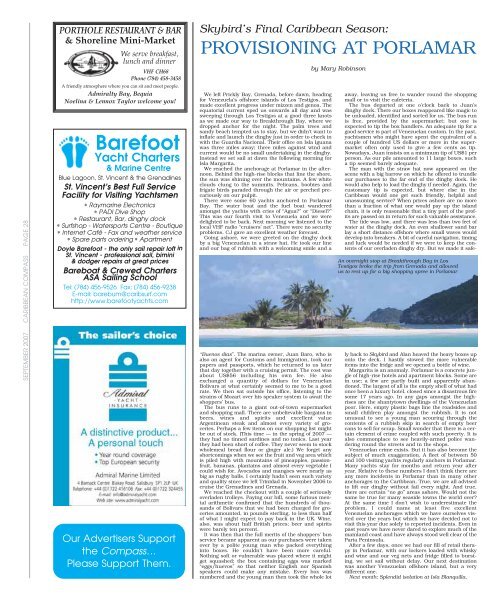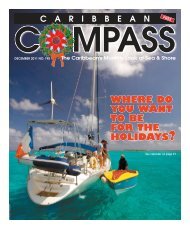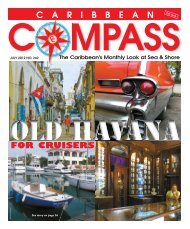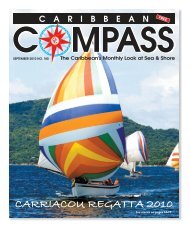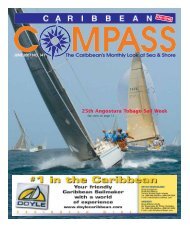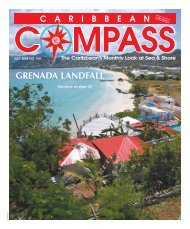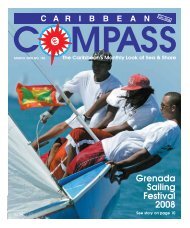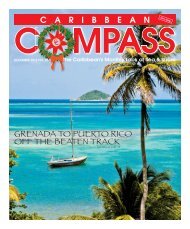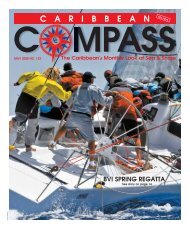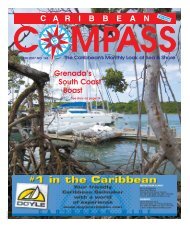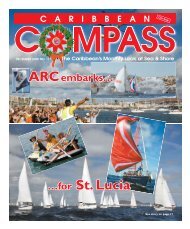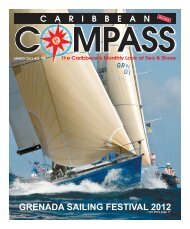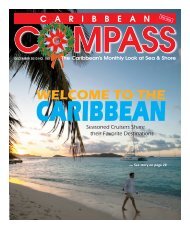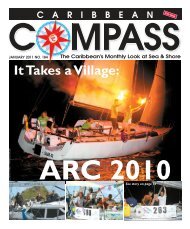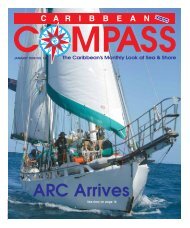Carriacou Regatta Festival 2007 - Caribbean Compass
Carriacou Regatta Festival 2007 - Caribbean Compass
Carriacou Regatta Festival 2007 - Caribbean Compass
You also want an ePaper? Increase the reach of your titles
YUMPU automatically turns print PDFs into web optimized ePapers that Google loves.
SEPTEMBER <strong>2007</strong> CARIBBEAN COMPASS PAGE 28<br />
PORTHOLE RESTAURANT & BAR<br />
& Shoreline Mini-Market<br />
We serve breakfast,<br />
lunch and dinner<br />
VHF CH68<br />
Phone (784) 458-3458<br />
A friendly atmosphere where you can sit and meet people.<br />
Admiralty Bay, Bequia<br />
Noelina & Lennox Taylor welcome you!<br />
Barefoot<br />
Yacht Charters<br />
& Marine Centre<br />
Blue Lagoon, St. Vincent & the Grenadines<br />
St. Vincent’s Best Full Service<br />
Facility for Visiting Yachtsmen<br />
✽ Raymarine Electronics<br />
✽ PADI Dive Shop<br />
✽ Restaurant, Bar, dinghy dock<br />
✽ Surfshop - Watersports Centre - Boutique<br />
✽ Internet Café - Fax and weather service<br />
✽ Spare parts ordering ✽ Apartment<br />
Doyle Barefoot - the only sail repair loft in<br />
St. Vincent - professional sail, bimini<br />
& dodger repairs at great prices<br />
Bareboat & Crewed Charters<br />
ASA Sailing School<br />
Tel: (784) 456-9526 Fax: (784) 456-9238<br />
E-mail: barebum@caribsurf.com<br />
http://www.barefootyachts.com<br />
Our Advertisers Support<br />
the <strong>Compass</strong>…<br />
Please Support Them.<br />
Skybird’s Final <strong>Caribbean</strong> Season:<br />
PROVISIONING AT PORLAMAR<br />
We left Prickly Bay, Grenada, before dawn, heading<br />
for Venezuela’s offshore islands of Los Testigos, and<br />
made excellent progress under mizzen and genoa. The<br />
equatorial current sped us onwards all day and was<br />
sweeping through Los Testigos at a good three knots<br />
as we made our way to Breakthrough Bay, where we<br />
dropped anchor for the night. The palm trees and<br />
sandy beach tempted us to stay, but we didn’t want to<br />
inflate and launch the dinghy just in order to check in<br />
with the Guardia Nacional. Their office on Isla Iguana<br />
was three miles away; three miles against wind and<br />
current would be no small undertaking in the dinghy.<br />
Instead we set sail at dawn the following morning for<br />
Isla Margarita.<br />
We reached the anchorage at Porlamar in the afternoon.<br />
Behind the high-rise blocks that line the shore,<br />
the sun was shining over the mountains. A few white<br />
clouds clung to the summits. Pelicans, boobies and<br />
frigate birds paraded through the air or perched precariously<br />
on our pulpit.<br />
There were some 60 yachts anchored in Porlamar<br />
Bay. The water boat and the fuel boat wandered<br />
amongst the yachts with cries of “Agua?” or “Diesel?”<br />
This was our fourth visit to Venezuela and we were<br />
delighted to be back. Next morning we listened to the<br />
local VHF radio “cruisers’ net”. There were no security<br />
problems. CJ gave an excellent weather forecast.<br />
Going ashore, we were greeted on the dinghy dock<br />
by a big Venezuelan in a straw hat. He took our line<br />
and our bag of rubbish with a welcoming smile and a<br />
“Buenos dias”. The marina owner, Juan Baro, who is<br />
also an agent for Customs and Immigration, took our<br />
papers and passports, which he returned to us later<br />
that day together with a cruising permit. The cost was<br />
about US$56 including his own fee. He also<br />
exchanged a quantity of dollars for Venezuelan<br />
Bolivars at what certainly seemed to me to be a good<br />
rate. We then sat outside his office, listening to the<br />
strains of Mozart over his speaker system to await the<br />
shoppers’ bus.<br />
The bus runs to a giant out-of-town supermarket<br />
and shopping mall. There are unbelievable bargains in<br />
beers, wines and spirits and excellent value<br />
Argentinean steak and almost every variety of groceries.<br />
Perhaps a few items on our shopping list might<br />
be out of stock. (This time — in the spring of <strong>2007</strong> —<br />
they had no tinned sardines and no tonics. Last year<br />
they had been short of coffee. They never seem to stock<br />
wholemeal bread flour or ginger ale.) We forget any<br />
shortcomings when we see the fruit and veg area which<br />
is piled high with mountains of pineapples, passionfruit,<br />
bananas, plantains and almost every vegetable I<br />
could wish for. Avocados and mangoes were nearly as<br />
big as rugby balls. I certainly hadn’t seen such variety<br />
and quality since we left Trinidad in November 2006 to<br />
cruise the Grenadines and Grenada.<br />
We reached the checkout with a couple of seriously<br />
overladen trolleys. Paying our bill, some furious mental<br />
arithmetic confirmed that the hundreds of thousands<br />
of Bolivars that we had been charged for groceries<br />
amounted, in pounds sterling, to less than half<br />
of what I might expect to pay back in the UK. Wine,<br />
also, was about half British prices; beer and spirits<br />
were barely ten percent.<br />
It was then that the full merits of the shoppers’ bus<br />
service became apparent as our purchases were taken<br />
over by a polite young man who packed everything<br />
into boxes. He couldn’t have been more careful.<br />
Nothing soft or vulnerable was placed where it might<br />
get squashed; the box containing eggs was marked<br />
“eggs/huevos” so that neither English nor Spanish<br />
speakers could make any mistake. Every box was<br />
numbered and the young man then took the whole lot<br />
by Mary Robinson<br />
away, leaving us free to wander round the shopping<br />
mall or to visit the cafeteria.<br />
The bus departed at one o’clock back to Juan’s<br />
dinghy dock. There our boxes reappeared like magic to<br />
be unloaded, identified and sorted for us. The bus run<br />
is free, provided by the supermarket; but one is<br />
expected to tip the box handlers. An adequate tip for a<br />
good service is part of Venezuelan custom. In the past,<br />
yachtsmen who might have spent the equivalent of a<br />
couple of hundred US dollars or more in the supermarket<br />
often only used to give a few cents as tip.<br />
Nowadays, Juan insists on a minimum tip of US$1 per<br />
person. As our pile amounted to 11 large boxes, such<br />
a tip seemed barely adequate.<br />
The man with the straw hat now appeared on the<br />
scene with a big barrow on which he offered to trundle<br />
our purchases to the far end of the dinghy dock. He<br />
would also help to load the dinghy if needed. Again, the<br />
customary tip is expected, but where else in the<br />
<strong>Caribbean</strong> would one get such friendly, helpful and<br />
unassuming service? When prices ashore are no more<br />
than a fraction of what one would pay up the island<br />
chain, it is only reasonable that a tiny part of the profits<br />
are passed on in return for such valuable assistance.<br />
The tide was low, and there was less than two feet of<br />
water at the dinghy dock. An even shallower sand bar<br />
lay a short distance offshore where small waves would<br />
develop into breakers. A bit of careful navigation, timing<br />
and luck would be needed if we were to keep the contents<br />
of our overladen dinghy dry. But we made it safe-<br />
An overnight stop at Breakthrough Bay in Los<br />
Testigos broke the trip from Grenada and allowed<br />
us to rest up for a big shopping spree in Porlamar<br />
ly back to Skybird and Alan heaved the heavy boxes up<br />
onto the deck. I hastily stowed the more vulnerable<br />
items into the fridge and we opened a bottle of wine.<br />
Margarita is an anomaly. Porlamar is a concrete jungle<br />
of high-rise hotels and apartment blocks. Some are<br />
in use; a few are partly built and apparently abandoned.<br />
The largest of all is the empty shell of what had<br />
once been a luxury hotel, closed since a disastrous fire<br />
some 17 years ago. In any gaps amongst the highrises<br />
are the shantytown dwellings of the Venezuelan<br />
poor. Here, empty plastic bags line the roadsides and<br />
small children play amongst the rubbish. It is not<br />
unusual to see a young man scouring through the<br />
contents of a rubbish skip in search of empty beer<br />
cans to sell for scrap. Small wonder that there is a certain<br />
element of crime coupled with such poverty. It is<br />
also commonplace to see heavily-armed police wandering<br />
round the streets and in the shops.<br />
Venezuelan crime exists. But it has also become the<br />
subject of much exaggeration. A fleet of between 50<br />
and 100 visiting yachts regularly anchors in Porlamar.<br />
Many yachts stay for months and return year after<br />
year. Relative to these numbers I don’t think there are<br />
any more incidents in Porlamar than in many other<br />
anchorages in the <strong>Caribbean</strong>. True, we are all advised<br />
to lift our dinghy without fail every night. And true,<br />
there are certain “no go” areas ashore. Would not the<br />
same be true for many seaside towns the world over?<br />
At the same time I don’t wish to underestimate the<br />
problem. I could name at least five excellent<br />
Venezuelan anchorages which we have ourselves visited<br />
over the years but which we have decided not to<br />
visit this year due solely to reported incidents. Even in<br />
past years we have never dared to explore much of the<br />
mainland coast and have always stood well clear of the<br />
Paria Peninsula.<br />
After a few days, once we had our fill of retail therapy<br />
in Porlamar, with our lockers loaded with whisky<br />
and wine and our veg nets and fridge filled to bursting,<br />
we set sail without delay. Our next destination<br />
was another Venezuelan offshore island, but a very<br />
different one.<br />
Next month: Splendid isolation at Isla Blanquilla.


